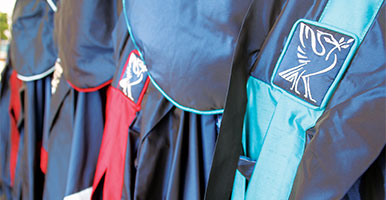Admiral Sir Philip Jones
Presented by Professor Peter Byers
Honourable Chancellor, it gives me great pleasure to introduce Admiral Sir Philip Jones, the former First Sea Lord and Chief of Naval staff, for the award of an Honorary Fellowship in recognition of an extraordinary career in the service of his country and during the ceremony where we are celebrating the achievements of our own graduates in maritime engineering.
It is fitting that such a maritime-centric city as Liverpool should honour the First Sea Lord and particularly fitting that Sir Philip, who was born across the water in the Wirral, has been so influenced by the sea.
Growing up alongside the great shipyard of Cammell Laird, where his father spent much of his working life, rising to be the Senior Engineering Manager there, he would be drawn to the great ships being built on the banks of the River Mersey.
In recent years, Sir Philip has been a key player in the resurgence of the Royal Navy, which has seen the entry into service the two largest aircraft carriers the Royal Navy has ever had, both of which were partly built at Cammell Laird.
Joining the navy in 1978, Sir Philip trained at the Royal Naval College, Dartmouth before reading for a degree in Geography at Mansfield College, Oxford.
After graduation he returned to his Fleet training which took him to the South Atlantic in 1982, where he saw active service in the Falklands.
His seagoing roles have included bridge watchkeeper, navigator and principal warfare officer. He commanded the frigates HMS Beaver and HMS Coventry, was Commodore of the Amphibious Task Group and Rear Admiral in command of the UK Maritime Forces.
He served in senior roles in the Fleet Headquarters, in the Ministry of Defence during the 2010 strategic defence review, and as Flag Officer in command of Regional Forces and the Maritime Reserves.
In 2011 he was promoted to Vice Admiral and served as Deputy Fleet Commander, Chief of Staff, Navy Command Headquarters and Chief Naval Warfare Officer before being appointed as Fleet Commander and Deputy Chief of Naval Staff in 2012.
His tenure as First Sea Lord began in 2016. The post of First Sea Lord and Chief of Naval Staff can trace its origins back to 1689, as part of the historical maritime roots of this sea going nation. The First Sea Lord is the professional head of the UK’s Royal Navy and is responsible for the direction and management of the whole of the Naval Service, comprising over 32,000 sailors and marines, both regular and reserve, and over 90 ships.
Sir Philip says that the most exciting part of his Naval career has been spent serving in and commanding ships, and he says his wife Elizabeth really does understand this; he says that is has been a privilege to travel around the world and over the last 40 years representing the Royal navy and the nation, and experiencing the changing fortunes of the naval service first hand.
The 2010 strategic defence and security review led to cuts in funding for the armed forces at the time, but also authorised the commission of the country’s largest ever aircraft carriers and enabled a more efficient and effective Navy to reassert its global presence.
The first new carrier, HMS Queen Elizabeth, will conduct her first operational deployment as a strike carrier in 2021 and, just last weekend, the second, HMS Prince of Wales, made her maiden voyage into Portsmouth and is due to be commissioned into the Royal Navy next month. These two supersized aircraft carriers are the most complex warships ever built and will ensure that the UK remains the leading European Naval power.
It is a tribute to Sir Philip, his active service and his work in promoting the Royal Navy, that he is retiring from the service as it reasserts itself on the world stage.
Chancellor… in recognition of a career of great distinction, and a personal and professional commitment to the Royal Navy, it is with great pleasure that I present Admiral Sir Philip Jones for admission to our highest honour, as an Honorary Fellow of Liverpool John Moores University.



